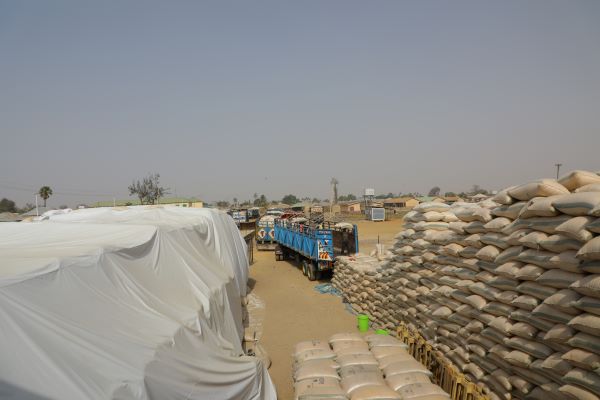
As the number of chronically hungry people increases, the world grows more vulnerable to food crises and insecurity. The FAO reports that in 2022 alone, about 282 million Africans face hunger daily and while global food production has reached a record high in recent years, one-third of all food produced for human consumption is lost or wasted – an equivalent of 1.3 billion tonnes. COVID-19 induced food-supply shocks underscored the need to build resilient food systems that adequately enables us reduce wastage through storage. In Africa, the persistent challenge of food insecurity continues to haunt the continent, with post-harvest food loss as a leading cause of food insecurity for millions of families across the continent, mainly due to inadequate storage facilities and infrastructure. Achieving zero hunger by 2030 will require either attaining zero loss or reducing waste significantly.
In August last year, NASA reported an unprecedented drought in East Africa for four consecutive seasons, the first of its kind in satellite records, compelling them to raise a deep concern about food insecurity in the coming years. Already, more than 560,000 children have been treated for severe malnutrition in Kenya, Ethiopia and Somalia. If conditions continue to decline, it is feared that 23 million to 26 million people in the region could face high levels of acute food insecurity. To address this challenge, the World Food Programme has proposed introducing low-cost storage facilities to preserve the prevailing harvest and reduce food loss. To support government efforts, private sector institutions such as AFEX Fair Trade Limited was launched, and within less than a year of launching in the region, AFEX received a certification as the First Private Warehouse Receipt Operator in Kenya; it has also established 20 warehouses across the Trans Nzoia and Uasin Gishu counties which are part of Kenya’s bread basket region and predominantly maize-growing communities. The farmer service company currently runs a storage capacity of 14,327MT and is on track to target 100,000MT in three years.
Warehousing to Drive Impact
With the rise of open markets and liberal trade, more governments are investing in warehousing as a stabilization mechanism, and a way to hedge against food shortages and food insecurity. Beyond the storage benefit it provides to farmers and the agriculture value chain, warehousing contributes directly to creating agriculture credit by creating secure collateral for the farmer, processor, and trader. Across Europe and Latin America, warehouse receipts have helped reduce food losses while creating a strong lending system for agriculture stakeholders. For instance, Argentina’s warehouse receipts systems account for a significant portion of agricultural lending and total receipts issued now exceeds $US 1 billion.
AFEX’s innovative approach builds on this and leverages technology to strengthen the production value chain. AFEX utilises a value chain management platform called WorkBench to handle intake and payment at its storage facilities, making for seamless storage transactions and enabling financing to be unlocked on the back of warehouse receipts that are issued when commodities are received. The management system empowers businesses to properly manage time-efficient services across inventory management, loan disbursement, supply chain management. The ripple effect for farmers is that they are now connected to systems that enable then access credit to boost capacity
Connecting Farmers to Markets
Access to market is a prevailing challenge for most East African farmers, so the opportunity to access storage facilities affords farmers the opportunity to store their produce until they can fetch optimal prices on the market. In Kenya, the government is currently deliberating the co-operative bill 2021, which will lead to the repeal of the Cooperative Societies Act, No. 12 of 1997. This should enable farmers to consolidate produce to sell as a group and eliminate middlemen who shortchange them. Connecting farmers to buyers directly also promotes ease of transactions and reduces the potential for losses along the value chain.
Aside from access to market, the co-operative structure will also enable the government to swiftly implement the fertiliser subsidy program, where subsidised fertiliser is disbursed to storage facilities and cooperatives in a bid to increase yield. It is expected that with a farmer-cooperative system, members can aggregate food volume and thereby improve their negotiating position significantly. This should ultimately lower the food cost and provide a better quality of life for smallholder farmers. AFEX is in full support of leveraging its expertise in facilitating trade in Africa to support the co-operative structures, share knowledge and support farmers with access to better credit systems for their work.
Strengthening the Value Chain
Food losses happen at every stage of the supply chain. Commodities can become damaged, spoiled or lost while being harvested, handled, processed, stored and/or transported. Combating food insecurity in Africa to ensure that food production is economically and environmentally sustainable will therefore require strengthening the agricultural value chain and equipping farmers and other stakeholders with the requisite skills to reduce losses.
By investing in transport and logistics infrastructure, for instance, farming communities will experience improved efficiency in moving crops from farms to storage facilities and markets. This reduces the time taken to transport produce, minimising the risk of spoilage and ensuring that farmers receive fair prices for their crops. Apart from facilitating access to finance for farmers, AFEX is also improving the efficiency of the value chain, especially on the side of market access, where the company has significantly contributed to reducing losses. It is also key to mention that state authorities responsible for agriculture can contribute to the strengthening of the value chain by enforcing quality standardisation and grading of farm produce. By minimising post-harvest losses in food systems, we can increase food availability without requiring additional resources or placing additional burdens on the environment.
Food insecurity in Africa is a complex challenge that requires multifaceted solutions, which include knowledge sharing, expertise building, and the provision of relevant resources to scale innovations to reach a larger number of farmers and traders across Africa. In addition, innovating for Africa’s storage problems, requires a deep understanding of local complexities in African nations. Much of AFEX’s success in Kenya and Nigeria is tied to our approach to different markets and their unique needs. For example, tapping into the already existing strong cooperative structure approach in Kenya versus the outreach model in Nigeria.
AFEX’s approach to promoting food security focuses on addressing the challenges faced by smallholder farmers and one of these is access to storage facilities. Africa desperately requires urgent and systematic intervention to ensure that the lack of food, a basic human need, does not consume the most youthful continent in the world. AFEX, which was recently recognised as Africa’s Fastest Growing Company by the Financial Times, works with over 450,000 smallholder farmers to promote food security and traded 526,850 metric tonnes of commodities in Nigeria, Kenya and Uganda. The planned expansion into 7 new markets over the next decade, will facilitate the spread of infrastructure to combat food waste/loss even as the company strives to reach a storage capacity of 1 million tonnes by 2025. Over the years, AFEX has produced over 1.7 million metric tonnes of food in Africa.









Impressive! Thanks for sharing this.
Comments are closed.